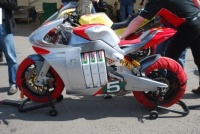The Isle of Mann TT — a 100-year-old festival of screeching tyres, throbbing engines and high-octane thrills and spills — may seem an unlikely showcase for green technology. But next June, if all goes according to plan, TT racing week will host what is being billed as the world’s first clean-emissions grand prix.

Although there is plenty that can be done to tweak and enhance the performance of electric bikes, Brandon thinks it unlikely that Kingston’s vehicle will use the regenerative braking systems featured on high-performance electric cars such as the Tesla.
He said: ’Racing bikes brake at the last minute because the braking is very hard. Most of the time the back wheel is just lifting off the ground and because you have a rear-wheel drive vehicle, regenerative braking isn’t easy. Unless we can find a way of hooking it up to the front wheel without incurring a weight penalty, the system is unlikely on a racing bike.’
Although Brandon is also keen to improve the efficiency of the vehicle through the use of lightweight materials such as carbon-fibre, he admitted these are not likely to be particularly ’green’.
So, while the use of emissions-free propulsions systems is a good place to start, Brandon anticipates future outings of the TTxGP. That way bike manufacturers can look at every aspect of a vehicle’s carbon footprint and take into account factors such as the emissions used to generate the electricity, or the environmental costs of manufacturing the materials, motors and batteries.
’One thought is that we could say to the competitors “you could have this many-mega joules of energy in whatever form you like and you use it as efficiently as you can”.’
You might as well accept that it’s going to happen and embrace the change,
Azhar Hussain
Simon Maddison, TTxGP’s technical director, who is putting the finishing touches to the regulations for next year’s race, confirmed that looking at the entire carbon footprint of the vehicle is one of the longer-term visions. ’We’re trying to keep a simple focus, but eventually we need to take a broader remit on the carbon footprint,’ he said.
Brandon’s group is also addressing another thorny issue in green motorcycle design — ensuring that enthusiasts, a fanatical bunch, are not turned off before they have a chance to consider the technology’s potential. With this in mind, the Kingston team is working on the development of speed-dependent noise generation software that will mimic the all-important roar of a motorbike engine at full throttle.
’When people go racing they want to hear noisy things, and I think it would detract from the spectator sport if the bikes were relatively quiet electric vehicles running around the TT circuit,’ said Brandon.
For Hussain — the proud owner of an 1,800cc motorcycle and no stranger to the visceral thrill of the open road — the aesthetic concerns of petrol heads are ultimately irrelevant.
’You might as well accept that it’s going to happen and embrace the change,’ he said.
While the prospect of zero-emissions vehicles taking to the famous circuit might rankle with traditionalists, Hussain said the race will sit well with a tradition of innovation that has characterised TT’s history.
’During the 1960s it was the place where all the Japanese manufacturers would go and show off their technology and launch their new bikes,’ he said. The event was a Mecca in the motorsport calendar.’
With a bit of luck TTxGP could help ensure that the event is still relevant in 100 years’ time. ’We’ve just had the centenary and if you look forward to the bicentenary what is it going to look like?’ asked Hussain. ’It’s a brave man who can say a century from now we’ll still be racing hydrocarbon vehicles.’





Swiss geoengineering start-up targets methane removal
No mention whatsoever about the effect of increased methane levels/iron chloride in the ocean on the pH and chemical properties of the ocean - are we...